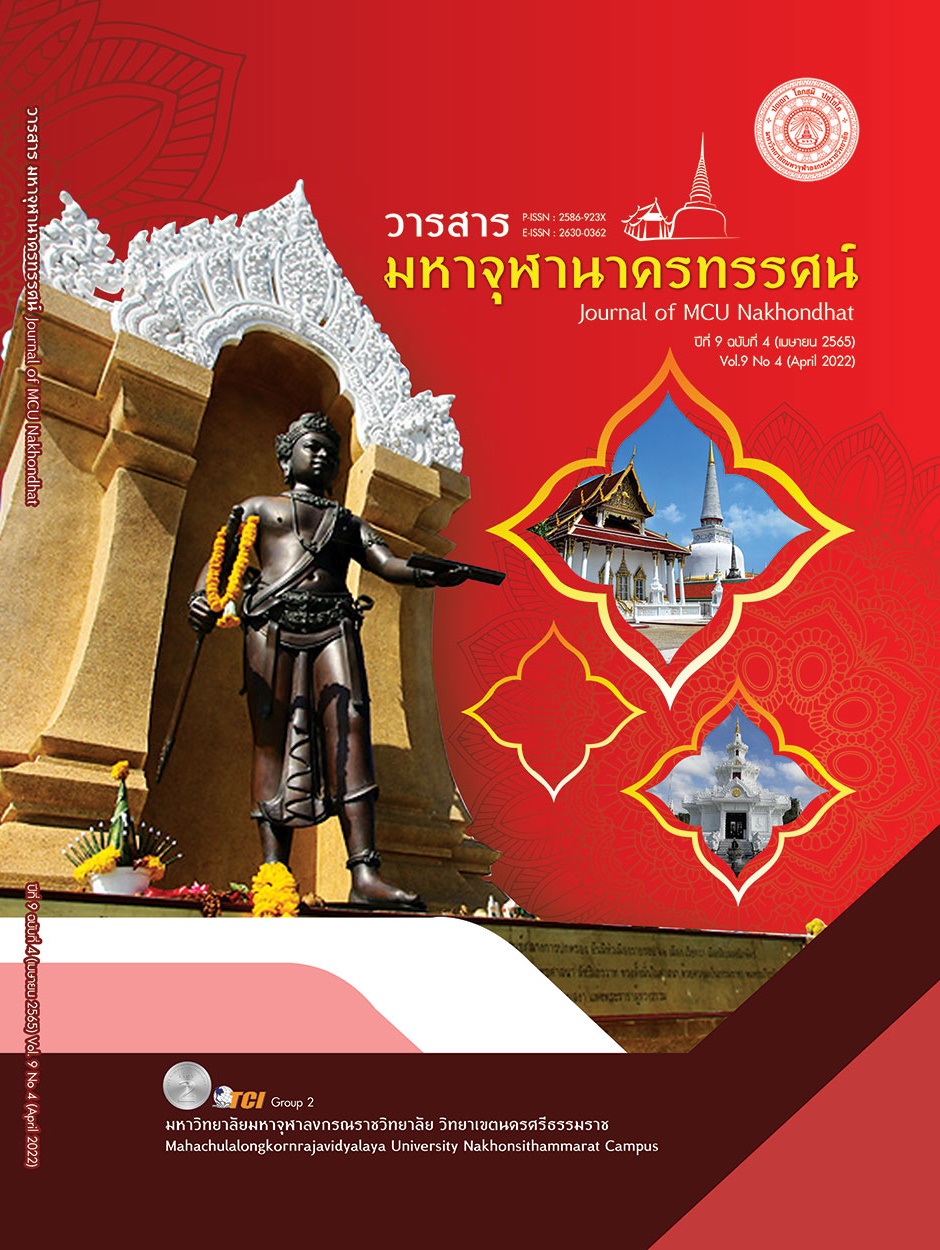THAI TEACHERS AND LEARNING MANAGEMENT IN THE DIGITAL DISRUPTION ERA
Main Article Content
Abstract
Disruptive innovation with high dynamic effecting individuals has access to many resources through modern technology for integration to the most efficient innovation under the process of learning is changing the teachers are therefore a person who is extremely necessary to developed to be ready, competencies and skills in using technology to improve teaching effectiveness to keep pace with the rapid changes, to enhance the necessary knowledge skills to learners. Therefore, teachers must rely on 3 principles of developments 1) Transformative learning is the expansion of consciousness through which an individual can question themselves about their own feelings, beliefs, assumptions, and perspective on their purpose. Individuals who are undergoing such a transformative process are believed to completely rewire and transform their beliefs, assumptions, and experiences into brand new expressive perspectives. 2) Adult learning is learning style that arises from changing the role of the teacher as the search for knowledge on their own, it is a result of circumstances arising and learning from experiences within a variety of individuals. 3) Self-directed learning is a process in which individuals take the initiative, with or without the help of others, in diagnosing their learning needs, formulating learning goals, identifying human and material resources for learning, choosing and implementing appropriate learning strategies, and evaluating learning outcomes. Teachers must focus on changing their roles to develop yourself, guide, give counsel and inspire learning or doing the right thing for students and colleagues as follows: 1) Being a person who is aware of the knowledge 2) Changing their role in teaching management 3) Continuous self-development 4) Using creativity 5) Using ICT in Professional development of teachers and an effective learning management and the most effective for students.
Article Details

This work is licensed under a Creative Commons Attribution-NonCommercial-NoDerivatives 4.0 International License.
References
กระทรวงศึกษาธิการ. (2545). พระราชบัญญัติการศึกษาแห่งชาติ พุทธศักราช 2542 (ฉบับที่ 2) และที่แก้ไขเพิ่มเติมพุทธศักราช 2545. กรุงเทพมหานคร: บริษัทสยามสปอรต์ ซินดิเค จำกัด.
กิติยวดี บุญซื่อ. (2546). รายงานการสังเคราะห์รูปแบบการพัฒนาครูทั้งโรงเรียน : โรงเรียนในโครงการโรงเรียนปฏิรูปการเรียนรู้เพื่อพัฒนาคุณภาพผู้เรียน. กรุงเทพมหานคร: พิมพ์ดีการพิมพ์.
ไกรยส ภัทราวาท. (2559). ติดอาวุธครู สร้างห้องเรียน 4.0. กรุงเทพมหานคร: กรุงเทพธุรกิจ.
พฤทธิ์ ศิริบรรณพิทักษ์. (ม.ป.ป.). กระบวนทัศน์ใหม่ของการบริหารการศึกษา. เรียกใช้เมื่อ 16 มกราคม 2564 จาก https://www.sammajivasil.net/news11.htm
วสันต์ ปานทอง และคณะ. (2556). “รูปแบบการพัฒนาครูเพื่อศิษย์ในสถานศึกษา สังกัดสำนักงานเขตพื้นที่การศึกษาประถมศึกษา”. วารสารศึกษาศาสตร์ มหาวิทยาลัยนเรศวร, 15(ฉบับพิเศษ), 193-205.
วิชัย วงศ์ใหญ่ และมารุต พัฒผล. (2562). Disruptive Teacher: ครูผู้ทำลายล้างการสอนแบบเดิมๆ. กรุงเทพมหานคร: ศูนย์ผู้นำนวัตกรรมหลักสูตรและการเรียนรู้.
สำนักงานคณะกรรมการพัฒนาการเศรษฐกิจและสังคมแห่งชาติ. (2559). แผนพัฒนาเศรษฐกิจและสังคมแห่งชาติ ฉบับที่ 12 (พ.ศ.2560-2564). กรุงเทพมหานคร: สำนักนายกรัฐมนตรี.
สุนันท์ สีพาย. (2562). บทบาทของครูไทยในการศึกษา 4.0. วารสารการวัดผลการศึกษามหาวิทยาลัยนเรศวร, 25(2), 3-14.
สุนันท์ สีพาย และไพฑูรย์ สินลารัตน์. (2561). เปลี่ยนผ่านการศึกษาไทยสู่การศึกษา 4.0. วารสารการวัดผลการศึกษา มหาวิทยาลัยนเรศวร, 24(2), 13-27.
สุมน อมรวิวัฒน์. (2546). ปรัชญาและแนวคิดของการพัฒนาครูและเครือข่าย. สานปฏิรูป, 6(65), 79-80.
อริญญา เถลิงศรี. (2561). Disruption: ทำลายล้างหรือสร้างโอกาส. เรียกใช้เมื่อ 10 มกราคม 2564 จาก https://www.trueplookpanya.com/ knowledge/content/52232/-edu-teaartedu-teaart-teaartdir
Knowles, M. S. (1975). Self-directed Learning: A Guide for Learners and Teachers. New York: Cambridge Book.
Mezirow, J. (1991). Transformative Dimensions of Adult Learning. San Francisco, CA: Jossey-Bass.
Reimers, E.V. (2003). Teacher Professional Development: An International Review of theLiterature. Paris: International Institute for Educational Planning.
Sparks, D., & Loucks-Horsley, S. (1989). Five models of staff development for teachers. Journal of Staff Development, 10(4), 40–57.
Taylor, K., Marienau, C., & Fiddler, M. (2000). Developing adult learners: Strategies for teachers and trainers. San Francisco: Jossey-Bass Inc., Publishers. 59-66.
Ubben, G.C., Hughes, L.W., & Norris, C.J. (2001). The principal: creative leadership for effective School. Boston: Allyn & Bacon.


